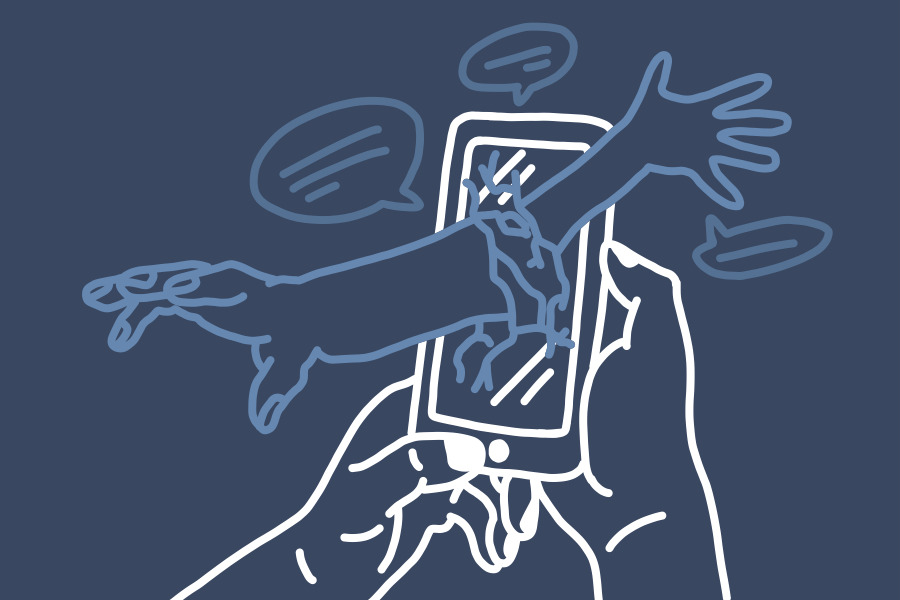Sexual abuse resources are neglecting victims of the Internet Age
The internet makes forming deep connections with people you’ve never met not only possible but also, for younger generations, expected. Online gaming, social media and online communities of niche interests allow for relationships that never would have been possible in a pre-internet age.
These connections are not always good. We have begun to identify and address issues that arise from this age of the internet. Cyberbullying is the clearest example. It’s hard to enter a school without seeing posters with girls crying over a “H8 U >:(” text message. But this is just a start.
A more difficult transition is observing how sexual abuse has changed in the Internet Age. When relationships can be built without physical contact, how do we define sexual abuse? Many would scoff. A stranger can’t rape you through text. But the increase in emotional reliance on online relationships and friendships, particularly among Gen Z, can easily open people up to manipulation.

We’ve accepted that adults can manipulate children into meeting in real life to prey on them, but what happens when they can’t meet up? Abusers will often still find a way to prey on their victims through manipulation and sexting. Scour the corners of social media and you will find survivors pouring their hearts out about their traumatic experiences with this, yet no mainstream sources seem to acknowledge it as an issue. There are no mentions of this solely online abuse proliferating, and no warnings of how to recognize signs of grooming. We are warned not to meet strangers in person and then — nothing.
This isn’t to say we shouldn’t discuss how the internet can be used for arranging physical sexual abuse and sex trafficking, but we cannot view that as the only online method of sexual abuse. This silence benefits the abusers, who are able to groom their victims without fear that they will recognize what is happening to them as abuse.
From the ages of 12 to 17, I was groomed and preyed upon by three different men online. I met them in different communities — two through online video games and one through the LGBTQ+ community on Tumblr. They befriended me, using my teenage need for attention and appreciation to gain my trust. They emphasized that we could talk about anything because of our deep friendship and how mature I was as they gradually desensitized me to sexual content.
They then manipulated me using what they discovered worked on me. They tapped into my budding anxiety and depression to make me empathetic towards them. One said he had a mental illness that made him hypersexual, so I had to send him photographs of myself he could masturbate to if I wanted to be a good friend.
In the case of another, if I refused to sext him, he would sink into a depression and begin detailing how he was trying to kill himself. I learned to respond positively to his sexts for fear that his blood would be on my hands.
Another simply preyed on my teenage desire to be mature and “adult.” He would sigh about my childishness if I hesitated to discuss sex with him, bemoaning how he forgot I was so young, that he couldn’t believe he was friends with me. So I changed, instead listening to and feeding all of his perverse obsessions despite the lump of discomfort in my stomach.
There’s a clear pattern to it, of gaining trust, learning weaknesses, isolating and desensitizing. I recognize these patterns now because of my experiences, but I didn’t recognize them when I was young because I was never told about it. Maybe, if I had known this when it mattered most, some of the abuse could have been avoided, or I could have escaped sooner.
Even now, if I Google “online grooming,” these patterns always end with some sex trafficking or physical abuse. The existence of articles about online grooming is new, and yet they always fall back on the tried and true conception that sexual abuse can only be physical. Additionally, they are written for parents, with no resources for identifying unhealthy aspects of your own relationships or how to recover from being groomed. If victims are old enough to be preyed upon, they are old enough to identify problems in their relationships, but we refuse to give them the resources to do so.
I’m an adult now. I live with the psychological effects of childhood sexual trauma. Watching the ever-younger demographics find friendship through computer screens, I can’t help but fear for them. There were no resources for me, and, six years later, there are no resources for them. How many kids must be unknowingly groomed and traumatized before we adapt to the Internet Age and acknowledge this growing form of modern sexual abuse?
Your donation will support the student journalists of Tulane University. Your contribution will allow us to purchase equipment and cover our annual website hosting costs.


